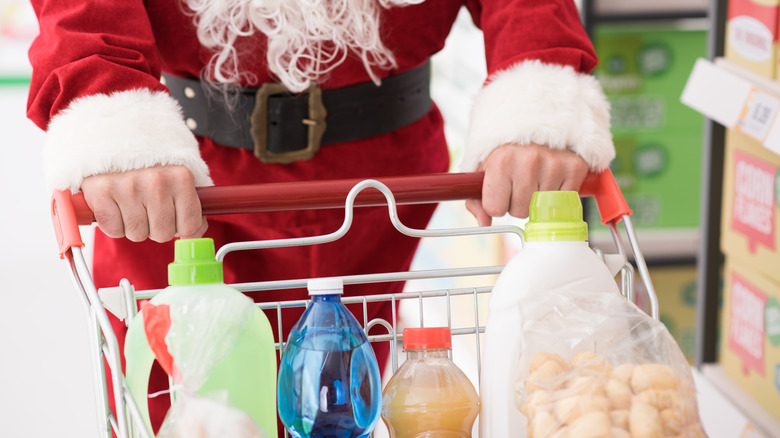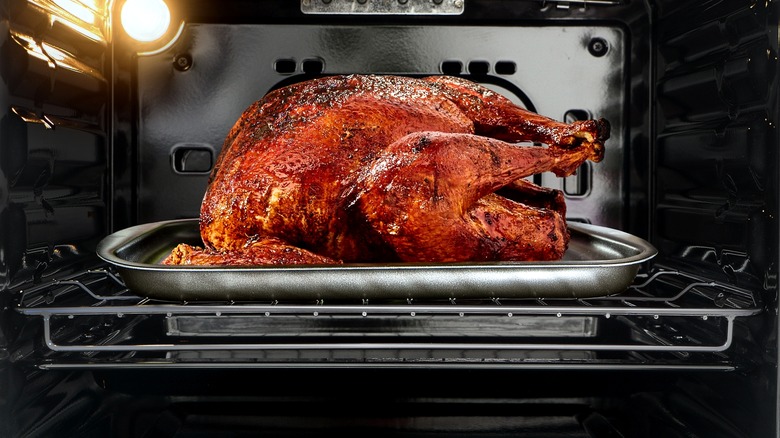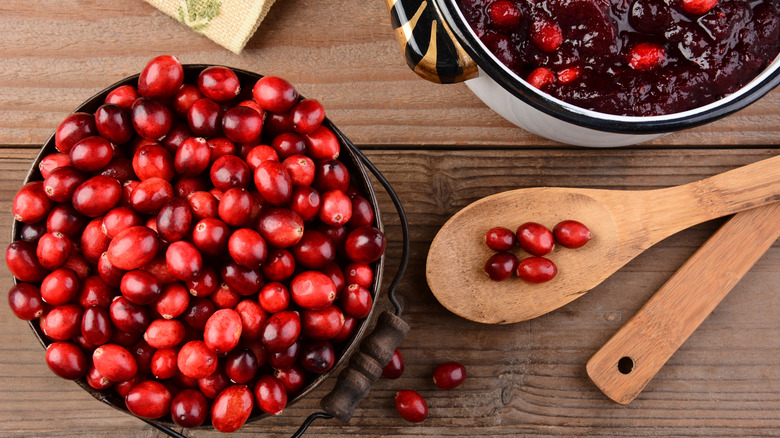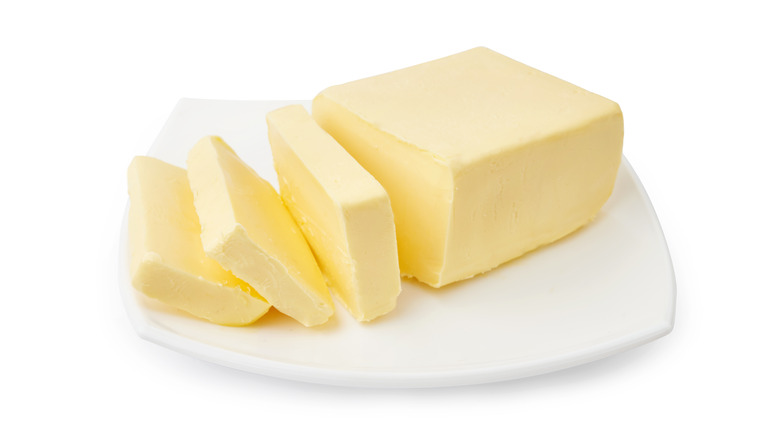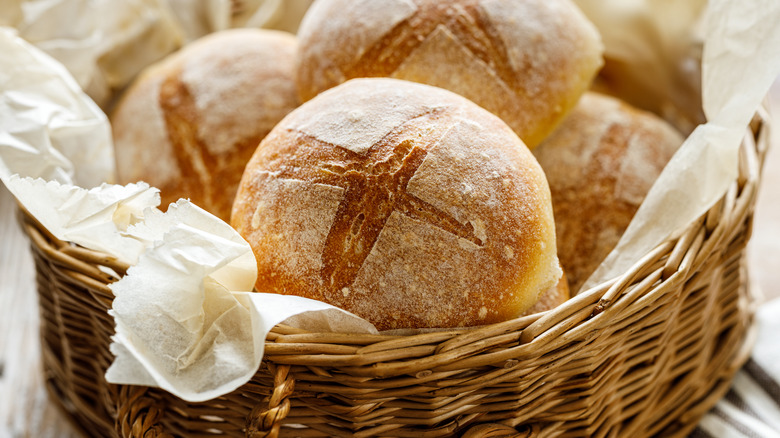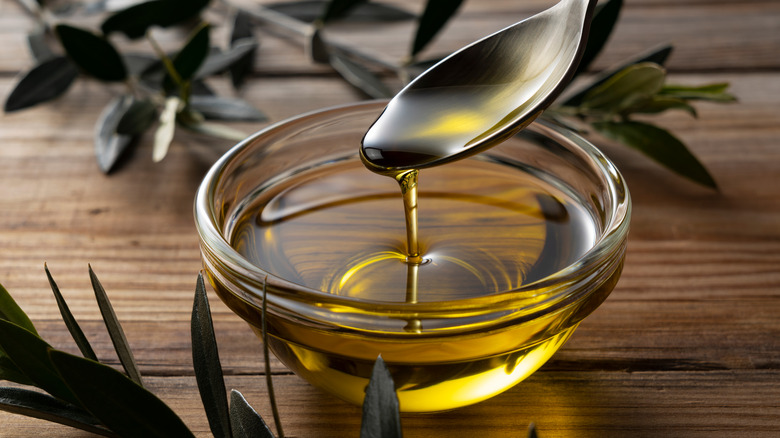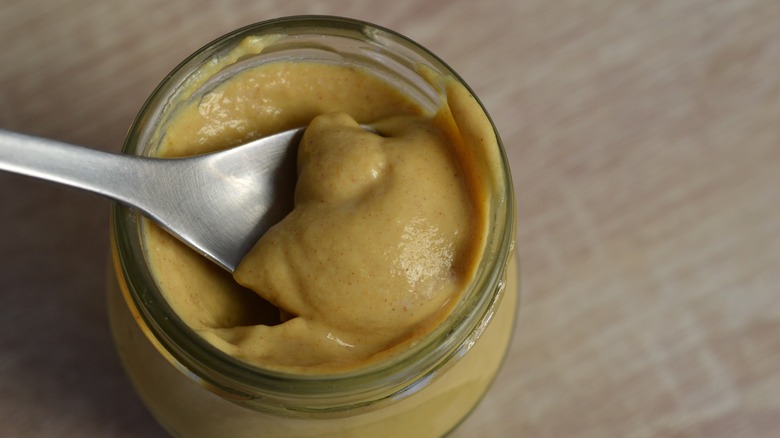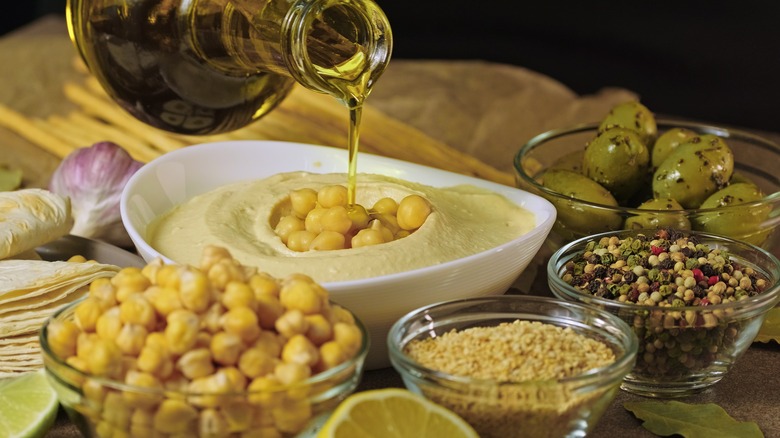12 Groceries That Might Be Hard To Find This Holiday Season
The western world is pretty used to getting everything it wants. We can purchase cheap turkeys at Thanksgiving, as much jellied cranberry sauce as we can eat, and as much overpriced popcorn as we can spill all over movie theater floors. But the world is changing and we're entering a new era in grocery stores. This means that we either can't get everything we want or we won't have enough money to pay for it. This includes some holiday staples we've all come to depend on.
Some of the forces behind the world's current food shortages are temporary. The COVID-19 pandemic, for example, mucked up the supply chain, but that's not going to last forever. The war in Ukraine is targeting a few specific favorites, too, but that won't become an endless conflict, either (we hope).
For other factors, though, it's pretty hard to imagine when circumstances will resolve. Climate change is causing severe, unpredictable weather all over the world that impacts foods we depend on like wheat and Dijon mustard. This means some of the shortages we're facing for the 2022 holiday season may be around for the long term. So if you can find the items on this list, enjoy them while you can. In the years to come, they may become too expensive for your holiday table or vanish all together.
Coffee
Every beautiful holiday begins with a hot cup of coffee, maybe flavored with a little peppermint creamer or some eggnog. Sounds nice, doesn't it? Except you may have some trouble finding coffee this holiday season, on account of climate change.
According to Food Ingredients 1st, South American coffee inventories are in decline ... way in decline. Unusually dry weather in Brazil is threatening the world's coffee supply. That may not sound terrible at first, since Brazil is just one country. The extra-bad news is the fact that Brazil is also the world's largest coffee grower, producing nearly 8 billion metric tons of Joe every single year (via Elevencoffees). Meanwhile, Colombia is facing unseasonably wet weather, and similar adverse weather conditions are affecting yields in Guatemala, Honduras, and Nicaragua as well. This isn't just a South American problem, either. Vietnam is the second-largest producer of coffee in the world and it's also experiencing declining stockpiles.
The sort-of good news is that it's not likely you won't be able to find coffee at all. But you can expect to pay more for it, especially at the drive-thru. Coffee giants like Starbucks and Peet's are likely to make their already expensive products even more so to help offset the increasing costs of their core products.
Wine and Champagne
If you were planning to welcome 2023 with a bottle of Champagne, you might want to shop early before the shelves are completely depleted. Supply chain issues are largely to blame for the shortage of Champagne in the United States, but climate change also has a hand in the problem. According to Wine Enthusiast, importers say it is taking two or three times as long to get Champagne shipped to the U.S., largely because of the residual effects of the pandemic.
To make things worse, in 2021 the Champagne region of France — the only part of the world that can call its bubbly "Champagne" —was hit by severe weather. A March heatwave burned the grapevines, a cold snap froze them, and then unusually harsh summer rains made many of the survivors succumb to mildew. This added up to one of the smallest harvests in decades. Remember that Champagne has to sit around for more than a year — two years or more for vintage blends — which means we'll start feeling the brunt of Champagne's weather woes around the new year and beyond.
It probably won't surprise you to hear that it's not just Champagne facing such problems. You'll also see this trend in other wine-producing regions like Portugal, which is reporting a 20% drop in production fueled by a local drought and an extreme heat wave (via Portugal Resident).
Turkey
The turkey shortage of 2021 didn't quite get to the point of fist-fights in the freezer aisle, but almost everyone freaked out a little when they heard they might have to settle for a couple of large chickens instead of the 25-pound behemoth that usually graces the Thanksgiving table. You may have even breathed a sigh of relief on Black Friday, knowing that you prevailed and the great turkey shortage did not conquer you or your family traditions.
Well, welcome to 2022. This year, there will also be a turkey shortage. This time, you can't blame COVID-19. Instead, an entirely different virus is at fault: bird flu, otherwise known as Highly Pathogenic Avian Influenza (HPAI). According to The Drum, close to 6 million turkeys were "depopulated" (that is, euthanized) between January and July when the virus infiltrated turkey farms all over the United States.
Don't worry though, as there are alternatives! Jaime Athos, chief executive of Tofurky, told The Drum that this year's turkey shortage is the perfect opportunity to ditch your decades-long family tradition in favor of a plant-based Tofurky made from vital wheat gluten and tofu, amongst other things (via Daily Burn).
Cranberry sauce
Well, at least you can still have your cranberry sauce. Maybe, if you smother it on your Tofurky, you can close your eyes and pretend it tastes like Thanksgiving. Except there's also a cranberry shortage.
According to Salon, Cranberry farmers have been experiencing extreme weather since at least 2015, when storm surges in coastal Massachusetts flooded cranberry crops with salt water, wiping them out. This happened again in 2017. In 2020, extreme drought damaged the cranberry vines, which were dealt a second blow when unseasonably wet weather struck.
This year hasn't been any better. There's another drought and late-season rains haven't been enough to save many of the parched crops. It's a perfect storm for growers since cranberries are notoriously delicate. When the weather is too wet, they're susceptible to fungus. When it's too dry, the vines die.
There's some hope for cranberry lovers, though — according to Clean Eating, the cranberry industry of Wisconsin is reporting an average crop. This isn't going to make up for the Massachusetts shortage, but it at least means there will be cranberries available somewhere — though you may have to pay a premium for them.
Chocolate
Oh, no. The world might be able to live without turkey and maybe it can manage without wine and Champagne (there's always beer), but there is no substitute for chocolate. It's the quintessential holiday junk. It fills kids' stockings, comes in fancy, ready-to-give boxes, is shaped like Santa, appears in pies, cakes, and other holiday desserts, and is responsible for at least five of the 10 pounds you can expect to put on during those last calorie-filled months of the year. What will the human race do without chocolate?
Back in the summer of 2022, Hershey's terrified the world when it announced there was going to be a Halloween chocolate shortage, due to residual supply chain issues created by COVID-19 and the war in Ukraine. Then, in October, the company changed its mind — it's only the "seasonally packaged" stuff that will be in short supply, they said (via Canton Rep).
A labor shortage in the chocolate industry is also contributing to the problem, so it may be more about not having the resources to move the chocolate around than it is about not having the ingredients to make it. If these problems continue into the holidays, it may be a lot harder to find holiday-themed chocolates like red and green Hershey's kisses and the aforementioned chocolate Santas. So, if you really must have that festive packaging, buy your sweet stocking stuffers early and hide them somewhere your kids (or you) can't reach.
Butter
Well, if you can't have chocolate you can still bake cookies, right? You might not be able to bake cookies, actually, or at least not so many and definitely not shortbread, which is like 99% butter. Because butter, as it turns out, is another one of those commodities that will either be in short supply or so ridiculously expensive you might consider buying a cow instead.
According to the Wall Street Journal, U.S. milk production is down, and that may mean you'll have to limit your holiday baking (or settle for shortening or — horror of horrors! — margarine). Butter hasn't disappeared from the shelves yet, but you can expect to pay a lot more for it. Butter prices are amongst those hit hardest by inflation. Over 2022, the price of butter rose by a whopping 24.6%, roughly one and a half times as much as the average price hikes seen in the rest of the grocery store.
So what gives, dairy industry? Labor shortages at dairy plants have left the country with a much smaller butter supply than it's used to, but that's not the only problem — it's also a shortage of cows. Dairy farmers are reducing herd sizes to cope with the increased costs of feed and, you know, everything else. Just like the rest of us.
Bread
Bread rolls are great (if you're okay eating them without butter), so let's just pad out that dinner of large chickens and marmalade (or whatever you got to replace the cranberry sauce) with some extra bread rolls and call it good. You know what comes next, don't you?
Yes, there's a shortage of bread. Well, more specifically, we're facing a dearth of wheat. This means it isn't just bread rolls that are in danger but also stuffing. According to the Bureau of Labor Statistics, flour prices in the U.S. are up by almost 50% compared to last year, so while you can still buy flour and flour-based products, you might want to limit how much you buy or look for substitutes. Don't be surprised if, as the holidays draw near, you see empty shelves in the baking department, though Saveur says this is more likely to happen in disadvantaged nations than in wealthier countries like the U.S.
You can blame the war in Ukraine for the high price of flour. According to Earth.org, both Russia and Ukraine are wheat heavyweights, accounting for around 30% of the world's exports. And the world's wheat problem isn't just happening because it's hard to get exports out of that war-torn part of the world. It's also because of the triple-whammy of climate change, plus the residual effects of the pandemic, plus a fertilizer shortage. Now may be the time to start researching wheat flour substitutes.
Olive oil
Olive oil makes for a lovely roast potato. It's one of the three most-recommended oils for achieving crisp, golden spuds for your holiday table, on account of its rich flavor profile and high smoke point (via Foodsguy). You probably don't need to be told that olive oil is also necessary for making pretty much every kind of Italian food, from pasta to salad dressing. You can find other oils that work in its place but, really, there's no good substitute for this stuff.
Sadly, an olive oil shortage is looming on account of drought and extreme heat all across Europe, particularly in olive-growing parts of the continent like Spain (currently the world's largest producer of olive oil, accounting for two-fifths of the global supply). An early heat wave in May struck the olive orchards just as the trees were blooming. Now, olives can handle heat later in the season, but their flowers scorch in hotter-than-usual springtime temperatures. According to CNN, olive yields in Spain are expected to be down by up to 38%. That will translate to harder-to-find olive oil and higher prices. Let's face it: olive oil was never really that cheap, to begin with, so your budget may not be able to account for the added expense.
Instead of olive oil, you can use canola for your roast potatoes, or duck or goose fat, which are reasonably priced alternatives to olive oil. Or take BBC Good Foods' advice and try sunflower oil.
Beer and soda
So remember that "just drink beer instead of Champagne" idea from earlier? Sorry to have deceived you, but a global beer shortage is on the horizon, which means you may need to find yet another bubbly alternative. The problem isn't with the hops harvest, either. Rather, it's with CO2 ... which means there may also be a global soda shortage.
Climate change is behind many of these food shortages, and, ironically enough, climate change is driven by greenhouse gases like CO2. The reason there's going to be a beer shortage is that there's actually a shortage of CO2. Wait, what? Well, unfortunately, the human race has yet to figure out how to cost-effectively recycle the CO2 we produce, so most of it is either used up by plants or simply goes into the air or ocean.
According to TIME, the CO2 shortage began when Denbury Energy, the owners of a CO2 production hub in Mississippi, tried to drill new wells in the Jackson Dome, an extinct volcano that contains a huge reservoir of CO2 gas. The new wells were supposed to help meet the rising demand for CO2. However, the gas inside the well was contaminated and therefore unfit for either industry soda makers or brewers. Axios says the incident, combined with COVID-related demand for the gas (CO2 helps to keep vaccines cold) and a 53% increase in beer consumption means there may not be enough CO2 to go around.
Dijon mustard
If you like to entertain around the holidays, you probably depend somewhat on Dijon mustard. In some households, this is an eclectic ingredient that can be used in everything from dips and spreads to marinades and crusts. Fortunately, there are a lot of appetizer alternatives out there that don't call for Dijon mustard, so it's not like this condiment is critical. That's important if you want to get through the holiday entertaining season with your reputation as a chef unscathed.
At the moment, the Dijon mustard shortage is mostly a problem for France. That's where most of the world's Dijon is consumed and where the pain of this lack is felt most deeply. Very, very, deeply. According to the Daily Beast, the run on mustard was caused by the 2022 trifecta of shortage-causing upheavals: COVID-19, the war in Ukraine, and climate change. France gets most of its brown mustard seeds from Canada. Alas, production in Canada went down by about 50% in 2022 after a heat wave wiped out half the harvest.
The BBC says it's not entirely correct to blame part of the shortage on Ukraine, since Ukraine grows mostly white mustard, not brown mustard. But because the white mustard supply out of Ukraine was drying up, mustard-makers turned to the brown stuff as a replacement, which made the already short shortage much shorter. Of course, all of those factors get confounded by the usual COVID-19-related supply issues, which equals unhappy French people and no Dijon-based appetizers.
Popcorn
If you love to snuggle up with your family and a rerun of "Rudolph, the Red-Nosed Reindeer," you may have to find some other snack to share around the couch. The Wall Street Journal warned of a looming popcorn shortage back in May 2022, saying that supply chain issues are causing a tight popcorn market. This news made movie theaters quake in fear since their profits generally depend on being able to charge a million dollars for a couple of pennies' worth of popcorn. The Wall Street Journal reported that some theater owners were paying more for popcorn just to keep farmers from switching to different crops such as soybeans. Surely literally no one wants to eat pop-soybean.
According to the USDA, corn production in general is falling, so tortilla chips might not work as a replacement for popcorn, either. Growers planted about 4% less corn in 2022 than they did the previous year, while soybean production is up by an equal amount. This suggests that growers may indeed think soybeans are a better bet than corn.
The summer movie season is over, but according to Market Realist, the popcorn shortage still looms. Like beer, mustard, turkey, and bread (and other notable shortages not on this list, such as pet food and baby formula), it's expected to continue through the end of 2022.
Chickpeas
If you can't make Dijon-crusted turkey stuffing rolls as a holiday appetizer (on account of there being no Dijon, turkey, or stuffing), at least you can open up a ready-to-eat package of hummus so your guests have something to snack on while you figure out what the heck you're supposed to do with a Tofurky.
But alas, there is also a chickpea shortage, so hummus (or any other chickpea-related item) may be off the table this year. Though it's worth noting that Sabra's problems earlier in the year (when the popular hummus brand was absent from supermarkets) were related to production adjustments it had to make after its products were recalled for salmonella (via Food Dive). If that wasn't bad enough, Sabra also had to recall 30,000 cases of hummus in October 2022 due to fears of listeria contamination (via Daily Beast). 2022 was a bad year for Sabra, to say the least.
And all of that isn't even related to the larger chickpea shortage, which Western Producer says is ongoing as of early October 2022. Chickpeas are grown in both Ukraine and Russia (via Reuters) and though there's still a good supply coming out of Turkey, you probably shouldn't depend on hummus for your appetizer table, just to be on the safe side.
